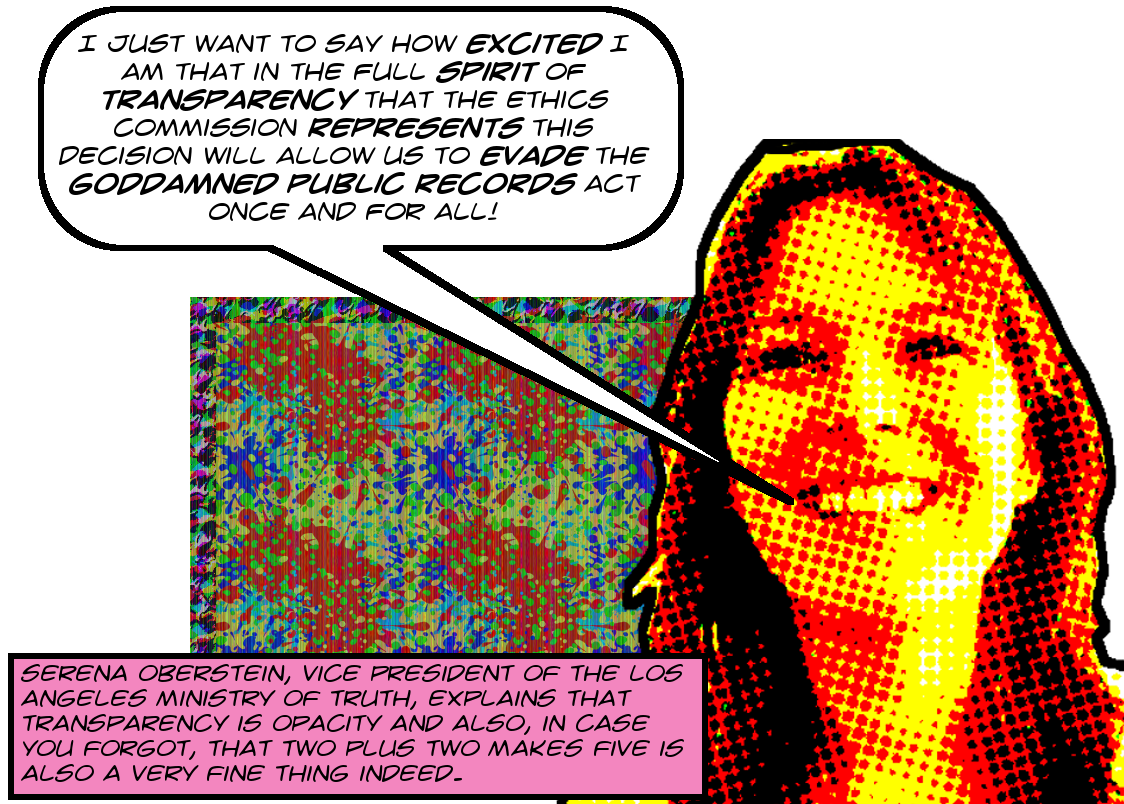On Tuesday, May 4, 2021 the Los Angeles Sunshine Coalition, represented by the incomparable Anna von Herrmann, filed a writ petition against the City of Los Angeles seeking to enforce compliance with the California Public Records Act. There are two basic issues at stake.
Continue reading On May 4, 2021 The Los Angeles Sunshine Coalition Filed A California Public Records Act Petition — Against The City Of Los Angeles — Over Violations By The Los Angeles Police Department — Involving Improper Redactions And Refusal To Release Other Required Records — Get A Copy Of The Petition Here!
Tag Archives: CPRA 6254(f)
In 1983 Public Opposition To The LAPD Political Espionage Unit — Public Disorder Intelligence Division — Was Strong Enough That The Police Commission Dissolved It — And Then-CD5 Repster Zev Yaroslavsky — One Of The Politicians Spied On By LAPD — Sponsored An Ordinance Which Excluded PDID Intelligence Files From The Much-Hated Investigative Exemption — Which Means All Of Them Must Be Released On Request! — Unless They’re Exempt For Other Reasons Than Investigative — But Even More Interesting — Maybe One Of The Most Interesting Things About The Los Angeles Administrative Code — Is That Yaroslavsky Specifically Precluded LAPD From Making A Burdensomeness Exemption Claim — Which Says That In 1983 LAPD Was Making Exactly The Same Kinds Of Bogus Exemption Claims They Love So Much Now — But Not About These Spy Records!!
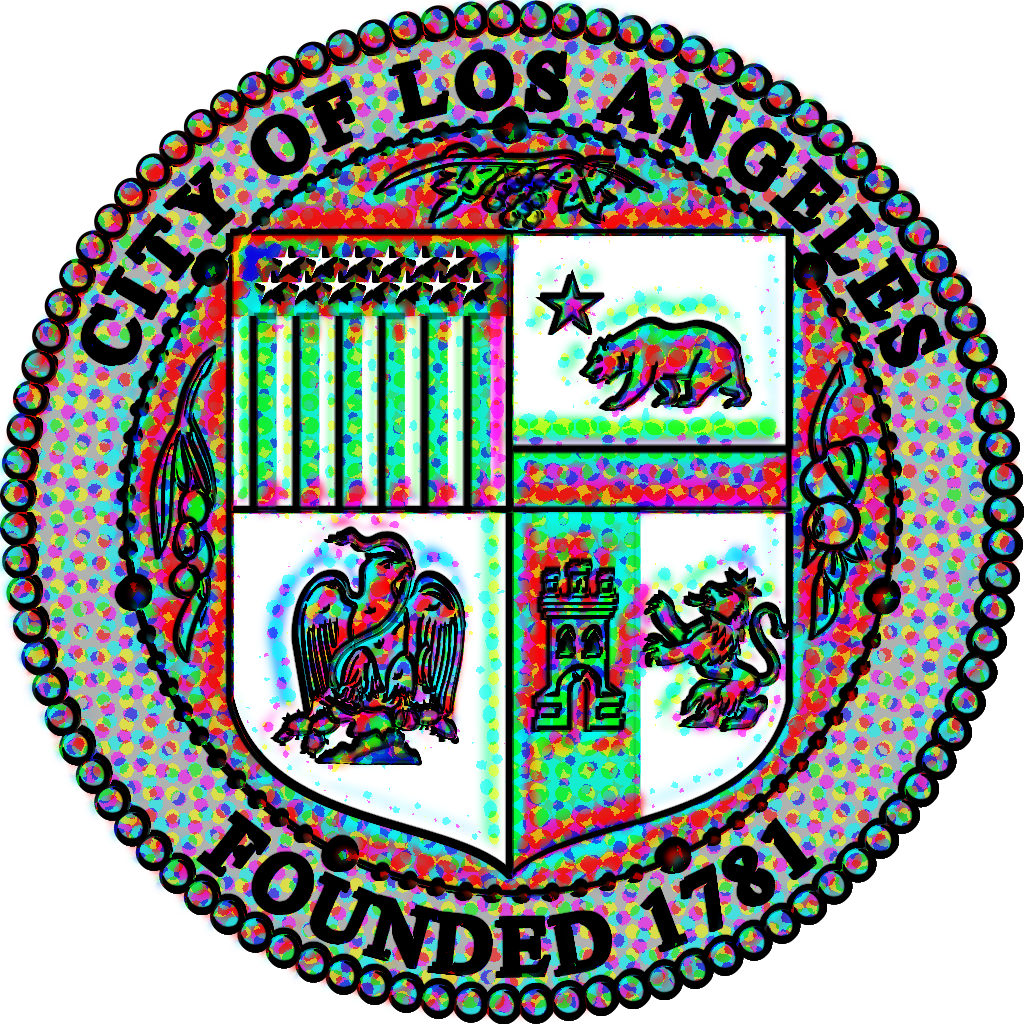 There is a lot of interesting stuff in the Los Angeles City Charter! And I didn’t realize it before, but the same is true of the Los Angeles Administrative Code! It turns out that the LAAC includes a local version of the California Public Records Act. This differs here and there from State law, and some of the differences are really interesting.
There is a lot of interesting stuff in the Los Angeles City Charter! And I didn’t realize it before, but the same is true of the Los Angeles Administrative Code! It turns out that the LAAC includes a local version of the California Public Records Act. This differs here and there from State law, and some of the differences are really interesting.
Let’s take a look at LAAC §12.21. This is the local version of CPRA §6254, which is the main list of exemptions. The infamous §6254(f) is the so-called investigative exemption, which basically allows the cops1 to refuse to release any records which can properly be described as “investigatory or security files.” And the local LA version, found at LAAC §12.21(f), is roughly the same albeit localized.
With at one exceedingly important exception! But before that, some background! The LAPD Public Disorder Intelligence Division was established by Chief Edward Davis in 1970, apparently as a reaction to the Watts Uprising in 1965. The PDID infiltrated hundreds of progressive political groups and also spied on electeds from the Mayor to the City Council.2 According to historian Max Felker-Kanter:3
The PDID operated as an updated Red Squad gathering “practically all” information on “potential threats” and storing as much information as possible. It was, in other words, a comprehensive surveillance program that significantly expanded the department’s intelligence operations.
Continue reading In 1983 Public Opposition To The LAPD Political Espionage Unit — Public Disorder Intelligence Division — Was Strong Enough That The Police Commission Dissolved It — And Then-CD5 Repster Zev Yaroslavsky — One Of The Politicians Spied On By LAPD — Sponsored An Ordinance Which Excluded PDID Intelligence Files From The Much-Hated Investigative Exemption — Which Means All Of Them Must Be Released On Request! — Unless They’re Exempt For Other Reasons Than Investigative — But Even More Interesting — Maybe One Of The Most Interesting Things About The Los Angeles Administrative Code — Is That Yaroslavsky Specifically Precluded LAPD From Making A Burdensomeness Exemption Claim — Which Says That In 1983 LAPD Was Making Exactly The Same Kinds Of Bogus Exemption Claims They Love So Much Now — But Not About These Spy Records!!
It Took Me Two Months To Get Even A Minimal Amount Of The Story Behind A May 7 Copaganda Tweet From LAPD Central Division Supreme Commander Timothy Scott Harrelson — With A Public Records Act Request That I Filed Pretending To Be A Reporter At Blue Line News — Which I Made Up And Bought A Domain For To Use For Email — And — Even Though Obvious — The Ploy Worked Briefly In That Commander Harrelson Apparently Told LAPD Discovery Staff That He Was Going To Call Me — Me Being The Made Up Reporter Rose Olsen From Blue Line News — But Then He Didn’t Call — And LAPD Apparently Caught On To The Ruse — But I Did At Least Learn The Names Of The Arrested People — And The Location Of The Arrests — All Of Which Turns Out To Be Less Interesting Than The Process — Which Is Just How It Goes Sometimes
 About two months ago, on May 7, 2020, the incomparable Lexis-Olivier Ray alerted me to the fact that, from his putatively safe haven in Simi Valley,4 Los Angeles Police Department Commander Timothy Scott Harrelson had just tweeted triumphantly about an LAPD raid on a “luxury apartment” Downtown due to “illegal cannabis sales.”5 But maybe you heard that cannabis is now legal in California? So this is essentially an arrest for tax evasion. Which is not something that ought to be at the top of any law enforcement priority list in the middle of a pandemic, right?6
About two months ago, on May 7, 2020, the incomparable Lexis-Olivier Ray alerted me to the fact that, from his putatively safe haven in Simi Valley,4 Los Angeles Police Department Commander Timothy Scott Harrelson had just tweeted triumphantly about an LAPD raid on a “luxury apartment” Downtown due to “illegal cannabis sales.”5 But maybe you heard that cannabis is now legal in California? So this is essentially an arrest for tax evasion. Which is not something that ought to be at the top of any law enforcement priority list in the middle of a pandemic, right?6
So I thought I’d look into the circumstances, and how better to do that than using the California Public Records Act?! There’s a problem, though, and that is the sad but true fact that the Los Angeles Police Department has completely stopped responding to my requests.7 When they first stopped I invented a few pseudonyms to make requests under, and this worked for a while.8 But then I started to file lawsuits over some of my pseudonymous requests so they caught on. Soon, I believe, they started tracking my pseudonyms as they identified them9 and then refusing to respond to those requests.
They are pretty prompt when the LA Times makes a request, though, which is part of the reason I think they’re singling out my requests for inaction.10 But this matter seemed important. Not only important enough for a new pseudonym, but for an actual backstory! And given LAPD’s responsiveness to the Times I thought of being a reporter.11 And from a sympathetic-sounding news outlet. And for a more convincing, at least superficially so, email address than the usual randomname3442@gmail.com. So I bought bluelinenews.org, fired up the random name generator and, using its suggestion, Rose Olsen, on May 9, 2020 I filed a CPRA request12 at lacity.nextrequest.com:
Continue reading It Took Me Two Months To Get Even A Minimal Amount Of The Story Behind A May 7 Copaganda Tweet From LAPD Central Division Supreme Commander Timothy Scott Harrelson — With A Public Records Act Request That I Filed Pretending To Be A Reporter At Blue Line News — Which I Made Up And Bought A Domain For To Use For Email — And — Even Though Obvious — The Ploy Worked Briefly In That Commander Harrelson Apparently Told LAPD Discovery Staff That He Was Going To Call Me — Me Being The Made Up Reporter Rose Olsen From Blue Line News — But Then He Didn’t Call — And LAPD Apparently Caught On To The Ruse — But I Did At Least Learn The Names Of The Arrested People — And The Location Of The Arrests — All Of Which Turns Out To Be Less Interesting Than The Process — Which Is Just How It Goes Sometimes
LAPD Has Over A Million Historical Photos In Its Archives – Going Back Almost A Hundred Years – These Are Public Records So I Asked For Copies – And They Were All Like No Way! – But In 2001 They Shared These With Some Gallery Owners – Who Put Together An Exhibit – Which Is Still Touring The World After All These Years – And They Are Selling Prints For Hundreds Of Dollars – And The Law is Very Clear That Once The City Lets One Person See Them They Must Let All Other People See Them – So Today I Filed Yet Another Lawsuit Seeking To Compel The City To Hand Over The Damn Goods!
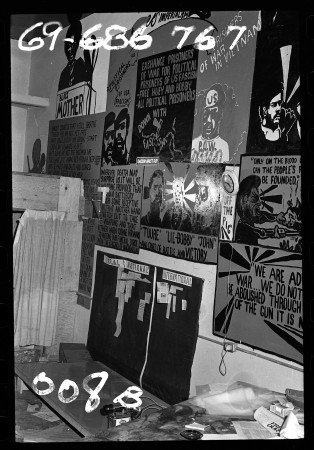
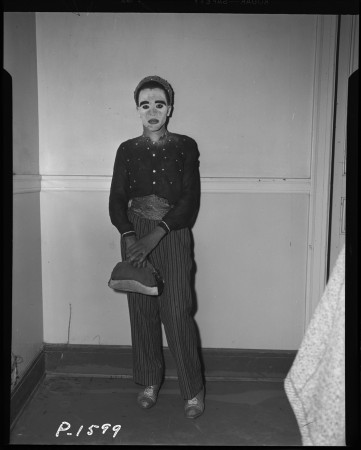
The gallery owners also published and sold a book of selected images.13 Since then, though, the LAPD hadn’t let anyone else look at the pictures. Kim and Richard were lamenting the tragic fact that such important historical material had been cherry-picked by so few individuals, when there are many historians whose work would be enhanced by access – and by extension enhancing Angelenos’ understanding of our city.14
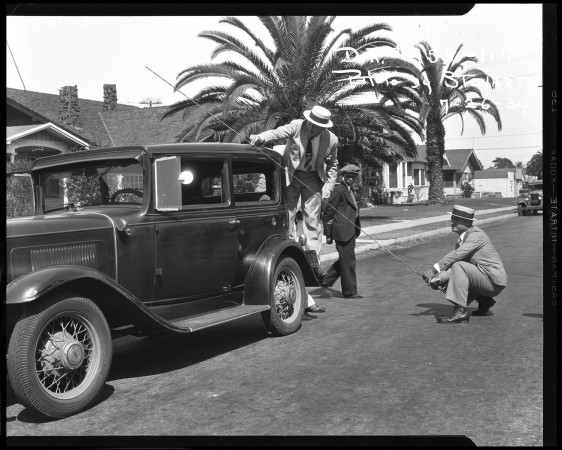
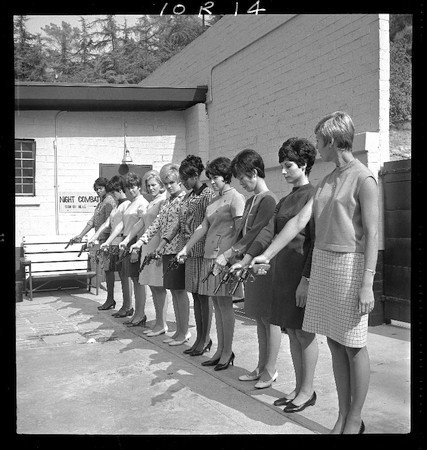
And that is really an understatement. Just look at the few examples scattered around this post, which I took from Fototeka’s site. There is an image from an LAPD men’s room spy camera, a picture of the Black Panther Party Headquarters after the shootout, a man apparently arrested for crossdressing, old buildings, many possibly unintentionally artistic closeups. An unimaginable variety.
These pictures could potentially give unprecedented insight into the LAPD’s past treatment of people of color, of LGBTQ people, gender noncomformists, and so on. Architecture, design, daily life. There is no limit to the public interest in seeing these images, in opening up this whole collection to the public. It is appalling that they’re not available to everyone.
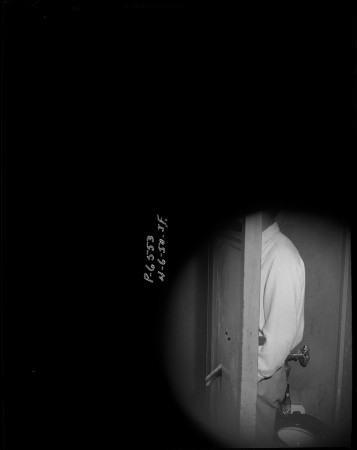
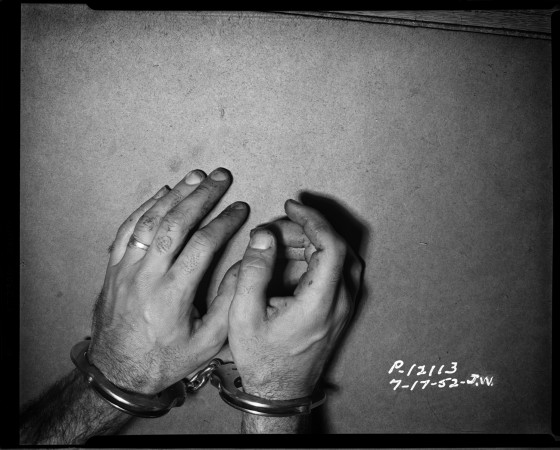
Now, the California Public Records Act is very, very clear that photographs are public records.15 And it’s also very clear that once a public record has been released to one member of the public it can no longer be withheld from any member of the public.16 Clearly, then, I thought, we are going to get access to these photos! So I submitted a request through the City’s NextRequest platform.
Now, the LAPD is famous for its idiotic denials, and their first response was consistent with their reputation. They told me that I couldn’t have them because they are investigative materials and therefore exempt under §6254(f).17 So I told them about the fact that a release to anyone constitutes a waiver and asked them to change their mind.
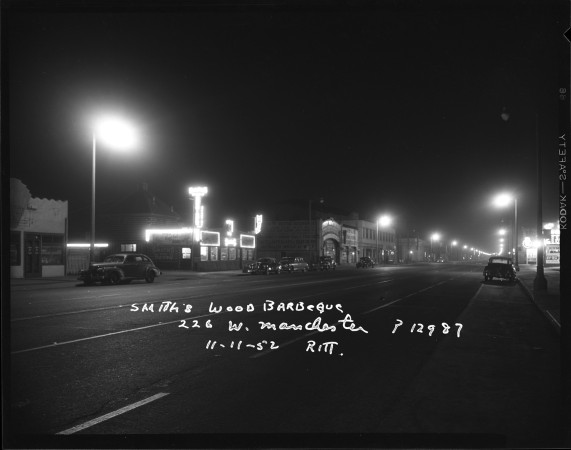
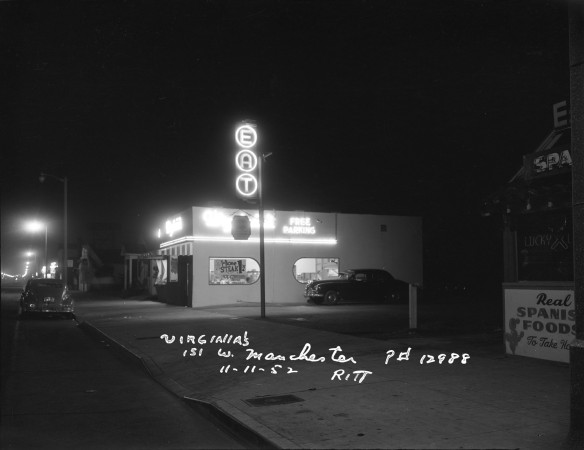
They ignored me, as they are wont to do, so I wrote to the City Attorney and asked again. And they also ignored me. So I contacted the incomparable attorney Anna von Herrmann and asked her what she thought. And what she thought was that we should file a petition to force the City to release the photos. And that’s what we did, and here is a copy for you! Read on for some selections.
Continue reading LAPD Has Over A Million Historical Photos In Its Archives – Going Back Almost A Hundred Years – These Are Public Records So I Asked For Copies – And They Were All Like No Way! – But In 2001 They Shared These With Some Gallery Owners – Who Put Together An Exhibit – Which Is Still Touring The World After All These Years – And They Are Selling Prints For Hundreds Of Dollars – And The Law is Very Clear That Once The City Lets One Person See Them They Must Let All Other People See Them – So Today I Filed Yet Another Lawsuit Seeking To Compel The City To Hand Over The Damn Goods!
City Of Los Angeles Sued To Enforce Compliance With The California Public Records Act – I Asked The City Attorney For A Bunch Of Nuisance Abatement Demand Letters – Which Everybody Knows Are A Major Tool Of Gentrification – And Although The Lawsuits Filed By The City Are Public – It Is Impossible To Understand The Scope Of The Problem Without Seeing The Demand Letters – Since Surely Many If Not Most Of These Cases Don’t End Up In Court – But Deputy City Attorney Bethelwel Wilson Was All Like Naaaah! – So I Was All Like You’ve Been Served!
 It occurred to me that maybe you might want a link to the petition right away without having to read through this whole damn blog post to get to it at the end. If so, here is a link to the petition!
It occurred to me that maybe you might want a link to the petition right away without having to read through this whole damn blog post to get to it at the end. If so, here is a link to the petition!
The Office of the City Attorney of Los Angeles has a thing called the Citywide Nuisance Abatement Program, or CNAP,18 in which they use various civil laws to have tenants or property owners declared nuisances and evicted, required to put up security cameras and allow LAPD warrantless access to them, or other such conditions.
Often allegations of gang activity are involved. So just for instance, there’s this case against the Chesapeake Apartments on Obama Blvd between La Brea and Crenshaw. Or this smaller scale one against a woman with a house near 52nd and Vermont. Or this against a small apartment building near 56th and Western.
Most famously this year the City Attorney has been relentlessly pursuing such an action against Slauson and Crenshaw Ventures LLC, owned by the late Nipsey Hussle and his partner David Gross. The allegations against Hussle and Gross’s property seemed unsupported by evidence, though, and this is apparently not unusual.
This program and others like it have long been understood as part of the gentrification machine, particularly pernicious in Los Angeles. That is, the City can drive out tenants in rent stabilized apartments, or force property owners to install cameras and give LAPD unfettered access to them, or impose various other conditions to serve their ends. This lets landlords raise rents or forces residents to become essentially LAPD informants.
Continue reading City Of Los Angeles Sued To Enforce Compliance With The California Public Records Act – I Asked The City Attorney For A Bunch Of Nuisance Abatement Demand Letters – Which Everybody Knows Are A Major Tool Of Gentrification – And Although The Lawsuits Filed By The City Are Public – It Is Impossible To Understand The Scope Of The Problem Without Seeing The Demand Letters – Since Surely Many If Not Most Of These Cases Don’t End Up In Court – But Deputy City Attorney Bethelwel Wilson Was All Like Naaaah! – So I Was All Like You’ve Been Served!
City Of Los Angeles Sued Yet Again To Enforce Compliance With The Public Records Act — This Time It’s Over CD1’s Obstinate Refusal To Produce Emails Between Staffer Jose Rodriguez And Two LAPD Officers About Homeless Encampments In CD1 — On The Advice Of The City Attorney Cedillo Staffer Mel Ilomin Claimed A Series Of Bogus And Ever-Shifting Exemptions — But I Got Two Responsive Records From LAPD — Which Show The Utter Implausibility Of The Exemption Claims
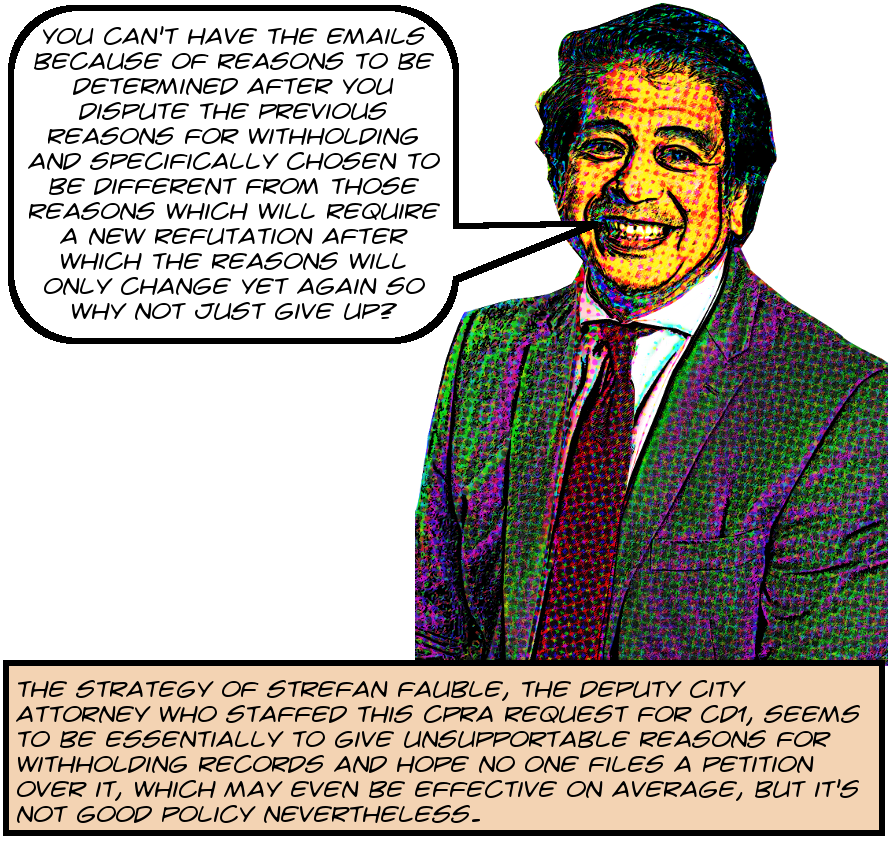 As you know, one of my long-term projects is using the public records act to understand how and why the City of Los Angeles schedules sweeps of homeless encampments and related enforcement actions. Emails between Council offices and either LAPD or LA Sanitation have been essential in this effort. For instance, a monumental recent email release from LAPD revealed a number of essential facts.
As you know, one of my long-term projects is using the public records act to understand how and why the City of Los Angeles schedules sweeps of homeless encampments and related enforcement actions. Emails between Council offices and either LAPD or LA Sanitation have been essential in this effort. For instance, a monumental recent email release from LAPD revealed a number of essential facts.
First, that CD11 staffer Taylor Bazley, despite official denials, had been complicit in the illegal placement of anti-homeless planters in Venice. This revelation led, in turn, to my filing a complaint against a list of LAPD officers with the Internal Affairs Division and a complaint with the Ethics Commission against Bazley. These same emails revealed that CD11 itself had been illegally withholding incredibly important records in the face of a number of my pending CPRA requests, which led to my filing another writ petition against the City seeking to compel the release of those materials.
And also, there among these 1,200 pages of stuff, were a couple emails between CD1 staffer Jose Rodriguez and a couple of police officers, Arturo Siguenas and Ruben Arellano, about homeless encampments and sweep scheduling at an encampment on Avenue 61 between Figueroa Street and Piedmont Avenue, one block to the North. Here’s the first one and also the second one. These emails in themselves are fairly innocuous, but since other emails in the release had turned out to be so very consequential, and since CD1 is a particular interest of mine although not, so far, with respect to homelessness, the importance of tracing this thread further was quite clear.
Thus I sent a request for all emails between Rodriguez and these two officers from between January 1, 2018 and April 30, 2019, the day before the date of the request:19 Continue reading City Of Los Angeles Sued Yet Again To Enforce Compliance With The Public Records Act — This Time It’s Over CD1’s Obstinate Refusal To Produce Emails Between Staffer Jose Rodriguez And Two LAPD Officers About Homeless Encampments In CD1 — On The Advice Of The City Attorney Cedillo Staffer Mel Ilomin Claimed A Series Of Bogus And Ever-Shifting Exemptions — But I Got Two Responsive Records From LAPD — Which Show The Utter Implausibility Of The Exemption Claims
LAPD Produces Three Records From The Regional Public Private Infrastructure Collaboration System In Response To My CPRA Suit!
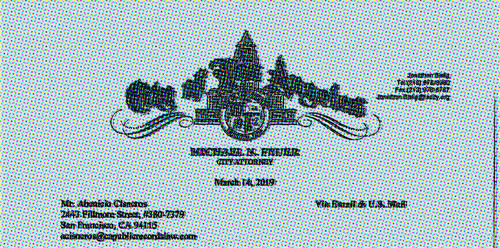 In February, my hand forced by the mindless obstructionism of the City of Los Angeles with respect to compliance with the California Public Records Act, I filed a petition asking a judge to compel them to hand over two classes of records. First were private person’s arrest forms generated in Hollywood in 2018. The point here is to be able once again to track arrests by the BID patrol after their appalling 2016 contract amendment took these records, at least for now, out of the reach of the CPRA.
In February, my hand forced by the mindless obstructionism of the City of Los Angeles with respect to compliance with the California Public Records Act, I filed a petition asking a judge to compel them to hand over two classes of records. First were private person’s arrest forms generated in Hollywood in 2018. The point here is to be able once again to track arrests by the BID patrol after their appalling 2016 contract amendment took these records, at least for now, out of the reach of the CPRA.
The second kind of records I’m seeking in the suit are postings to the Regional Public Private Infrastructure Collaboration System, familiarly known as RPPICS. This is some kind of cop bulletin board that a lot of BIDs have access to, and the LAPD claimed that everything on the system could be withheld from me under the so-called investigative materials exemption to the CPRA, found at §6254(f).
And it’s these last ones that seem to have cracked the case. Last Thursday the City of Los Angeles, in the person of Deputy City Attorney Jonathan Bislig, sent over this letter admitting that the City possessed responsive RPPICS material that was not exempt and yet had not been produced. And they attached four pages of material, constituting three responsive records. There’s a transcription of the letter and of one of the RPPICS items after the break, and here are links to all three:
- August 2, 2018 Joint Regional Intelligence Center Daily Report
- August 4, 2018 Joint Regional Intelligence Center Daily Report
- August 13-26, 2018 RPPICS High Visibility Deployment Recommendation
This is not only hugely important because we finally get to see some material from the hitherto top secret RPPICS, but also because the fact that the City released previously withheld material as a result of a suit means that I’m the “prevailing party” and therefore that the City has to pay my lawyer. This was held in the monumental 1991 case Belth v. Garamendi, which interpreted §6259(d) of the CPRA thus:
In this case we hold that Government Code section 6259, subdivision (d), mandates an award of court costs and reasonable attorney fees to a plaintiff who prevails in litigation filed under the California’s Public Records Act. We further hold that the plaintiff has prevailed within the meaning of the statute when he or she files an action which results in defendant releasing a copy of a previously withheld document.
This release is also hugely important because it shows really clearly that LAPD’s original denial was completely bogus. There’s nothing investigative at all about these three records. They falsely characterized them that way purely so they didn’t have to produce them, or even search for them, for that matter. It’s shameful that LAPD, and the City of Los Angeles as a whole, treats its mandated duties under the CPRA so lightly. It’s also shameful that the only means to enforce compliance is a lawsuit.
Together, these shameful facts mean that the only possible strategy is to keep suing them until they get their act together. It’s going to be expensive for taxpayers, who have to foot the City’s legal bill and also the requester’s in successful cases, but as Sigmund Freud famously said, if you don’t pay you don’t get better. More news as I have it, and turn the page for some transcriptions.
Continue reading LAPD Produces Three Records From The Regional Public Private Infrastructure Collaboration System In Response To My CPRA Suit!
Los Angeles Police Department Sued To Enforce Compliance With California Public Records Act — At Issue Are Two Classes Of Records — Both Of Which LAPD Claims Are Investigative And So Exempt From Release — First Are Private Person’s Arrest Forms — Necessary To Track BID Patrol Arrests — Second Are Reports From RPPICS — Some Kind Of Top Secret Cop Tracking And Discussion System — Putatively For Anti-Terrorism
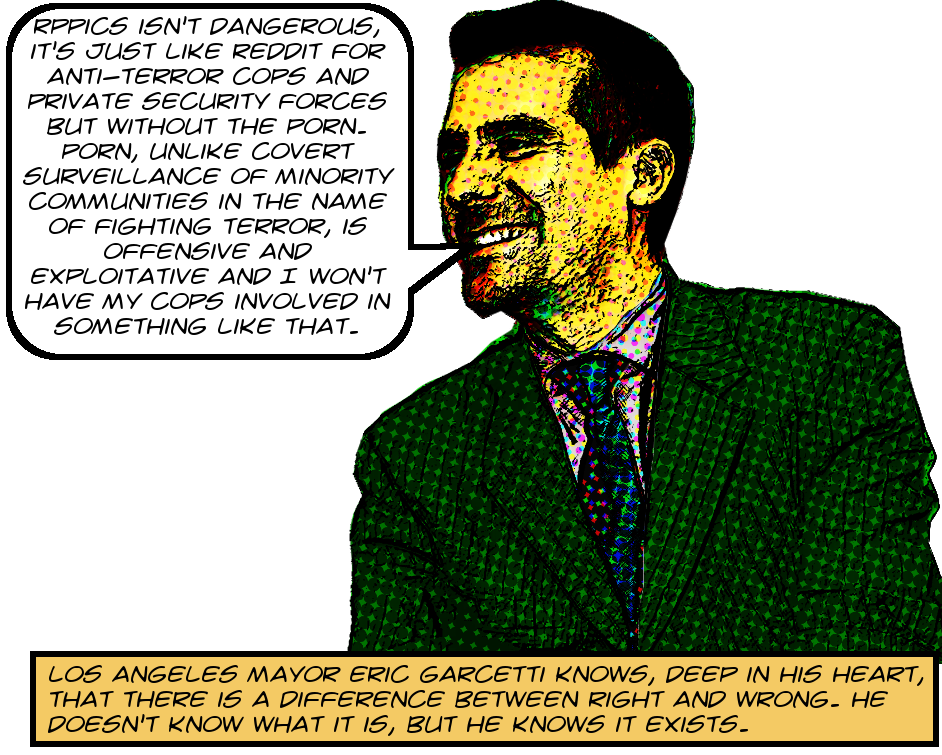 The LAPD has been notoriously bad at complying with the California Public Records Act. So much so that in 2017 the ACLU sued them for systemic violations of the law, which is in addition to any number of small-scale suits based on individual violations, like e.g. Stop LAPD Spying has had to sue them twice, once in 2015 and again in 2018.
The LAPD has been notoriously bad at complying with the California Public Records Act. So much so that in 2017 the ACLU sued them for systemic violations of the law, which is in addition to any number of small-scale suits based on individual violations, like e.g. Stop LAPD Spying has had to sue them twice, once in 2015 and again in 2018.
These suits were based on the LAPD’s longstanding habit of completely ignoring CPRA requests, often for years at a time. However, since the City of LA started using the NextRequest CPRA platform the LAPD has gotten quite a bit more responsive, although they can still take a maddeningly long time to respond and produce records.
This welcome improvement in LAPD responsiveness does not mean that all is well in Cop-CPRAlandia. They will still arbitrarily deny requests and then cut off the conversation, and they did this to me twice in 2018. Sadly, the CPRA provides no recourse at all for arbitrary unjustified denials beyond the filing of a lawsuit,20 which is what the path I was forced to follow by the LAPD’s extraordinary and unsupportable intransigence. You can read the complaint here, written by the incomparable Abenicio Cisneros, and/or see transcribed selections below the break.
There are two issues at stake. In the first place, remember back in 2016 when Kerry Morrison and her merry gang of curb-stomping thugs at Andrews International Security altered their contract to be able to withhold public records from me? That left me with no way to tell exactly who said curb-stomping thuggie boys arrested, information they naturally wanted to obscure from me because they tend to arrest the wrong people and rather than mend their ways they prefer to cover up their misdeeds.
But last year I discovered that every time the BID Patrol arrests someone they fill out a form for the LAPD. Here is an example of one. As it’s essential to find out not only how many arrests the BID Patrol makes21 but who they’re actually arresting, I requested that the LAPD give me all of these forms from Hollywood from 2018. They refused, and that is my first cause of action.
The other issue has to do with some Orwellian slab of web app crap known as the Regional Public Private Infrastructure Collaboration System. I learned about this from some emails I got from the Downtown Center BID in response to a CPRA request. You can see the emails here on Archive.Org, but they’re not that interesting. They mostly just announce that new information is available on RPPICS, and since they won’t give up the goods, there’s no way to tell what that is.
But this kind of public/private collaboration sharing between police and security is famous for being misused for political surveillance and other illegal and antihuman activities. The LAPD and private security already get up to enough of this in open emails, as does the freaking BID Patrol. Imagine what they’re doing in secret. But we don’t have to imagine, we can make CPRA requests! Which is what I did, asking LAPD for a year’s worth of postings so as to learn what the heck these people were up to in their little secret world. Again, they denied my request, and this is my second cause of action.
And turn the page, if you will, for a few technicalities about the LAPD’s exemption claims and transcribed selections from the petition itself.
Continue reading Los Angeles Police Department Sued To Enforce Compliance With California Public Records Act — At Issue Are Two Classes Of Records — Both Of Which LAPD Claims Are Investigative And So Exempt From Release — First Are Private Person’s Arrest Forms — Necessary To Track BID Patrol Arrests — Second Are Reports From RPPICS — Some Kind Of Top Secret Cop Tracking And Discussion System — Putatively For Anti-Terrorism
Ethics Commission Veep Serena Oberstein Announces That She Is Very Excited To Have Found A Way To Evade The Public Records Act While Claiming That She’s Evading It “In The Spirit Of Transparency Which The Ethics Commission Represents.”
The Los Angeles Ethics Commission held its December meeting this morning, and I recorded the whole thing22 and you can watch it either on YouTube or else on Archive.Org. Of course the main event was the last two items to be discussed regarding proposed updates to the Municipal Lobbying Ordinance, and I’ll have something to say about that whole mishegaas later in the week I hope. And there was also an instance of silence speaking louder than words, as the Commission completely ignored my recent request that they consider adopting a disclosure rule for ex parte contacts between Commissioners and those who would influence them.
Such contacts, of course, are a serious problem with our Ethics Commissioners, not least Serena Oberstein, the lobbyists’ best friend, who was involved in a minor yet horrifying interlude at this morning’s meeting which is the subject of tonight’s rant. The issue was whether and how the Ethics Commission’s investigators should disclose to the targets of their investigations that the investigations have become inactive.
This came up at the October meeting, and you can watch the whole episode here if you’re interested. The short version is that the investigators presently do not inform investigative targets when they’ve stopped investigating due to confidentiality mandated by the City Charter. Commissioner Serena Oberstein is deeply concerned that all these targets are going to be unsettled and anxious by not knowing that they’re not being actively investigated and she wanted staff to issue closure letters.
Such letters turned out not to be legally or politically possible, but at today’s meeting Sergio Perez, Director of Investigations, presented this proposal, adopted unanimously by the Commission, which recommended that policy be changed to allow oral notice to those being investigated that their investigations had become inactive. This recommendation putatively avoids the confidentiality requirement by invoking LAAC §24.29(c)(2), which states that:
Continue reading Ethics Commission Veep Serena Oberstein Announces That She Is Very Excited To Have Found A Way To Evade The Public Records Act While Claiming That She’s Evading It “In The Spirit Of Transparency Which The Ethics Commission Represents.”

